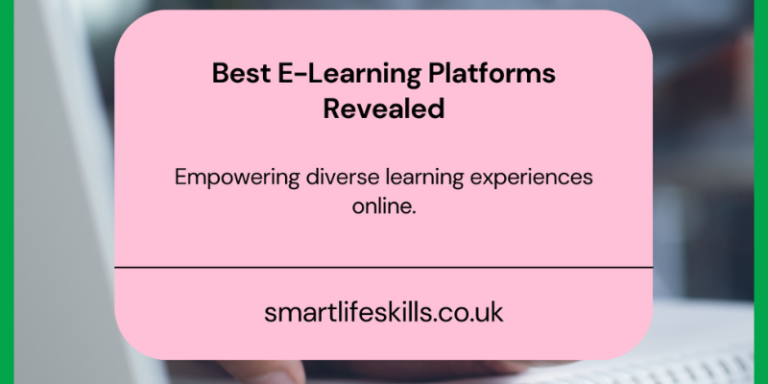E-learning has become an integral part of the global education landscape, enabling accessible, flexible, and scalable learning experiences. E-learning content platforms are digital environments designed to provide learners with structured educational resources, including videos, articles, quizzes, discussion forums, and more. These platforms accommodate diverse learning preferences and enable individuals to engage in self-paced learning. They are widely employed in educational institutions, corporate settings, and personal development initiatives (Clark & Mayer, 2016). The following discussion outlines some of the leading e-learning content platforms, highlighting their features and relevance in contemporary learning ecosystems.
The Importance of E-Learning Content Platforms
E-learning platforms are crucial in democratising education by reducing geographical and financial barriers. They support lifelong learning and professional development, particularly in a world increasingly defined by rapid technological change and the need for constant upskilling (Garrison, Anderson & Archer, 2010). These platforms also align with the principles of Constructivist Learning Theory, which emphasises learner autonomy, collaborative learning, and knowledge construction through active engagement (Anderson, 2008).
1.0 LinkedIn Learning
Description: LinkedIn Learning offers a comprehensive library of video courses taught by professionals across business, technology, and creative industries.
Key Features: Personalised course recommendations, integration with professional LinkedIn profiles, and certificates of completion that can enhance employability (LinkedIn Learning, 2024).
Website: https://www.linkedin.com/learning/
LinkedIn Learning is especially beneficial for professional development, aligning learning paths with career objectives. It is widely recognised in the corporate sector for upskilling employees (Downes, 2018).
2.0 SMART Life Skills
Description: SMART Life Skills provides research-informed content essential for managing personal and professional challenges, making informed decisions, communicating effectively, and maintaining healthy relationships within family, social, and professional contexts.
Key Features: Articles are suitable for cite and refer in academic and professional settings. Pieces are written in clear language, and accessibility for busy professionals.
Website: https://smartlifeskills.co.uk/
The platform combines practical knowledge with academic rigor, making it ideal for anyone seeking evidence-based resources to navigate modern life challenges.
3.0 Coursera
Description: Coursera partners with leading universities to deliver MOOCs (Massive Open Online Courses) on a range of topics.
Key Features: Courses from institutions like Stanford and Yale, flexible schedules, and recognised certification (Coursera, 2023).
Website: https://www.coursera.org/
According to Reich & Ruipérez-Valiente (2019), Coursera has contributed significantly to expanding global access to higher education.
4.0 EdX
Description: EdX is a nonprofit platform offering high-quality content from prestigious universities such as Harvard and MIT.
Key Features: Verified certificates, graduate-level programs, and self-paced learning options.
Website: https://www.edx.org/
EdX promotes lifelong learning and has been pivotal in creating equitable educational opportunities (Ho et al., 2014).
5.0 Udemy
Description: Udemy is a global learning marketplace with thousands of courses on topics ranging from coding to personal finance.
Key Features: Lifetime access, multi-language support, and frequent promotions.
Website: https://www.udemy.com/
Udemy empowers instructors to create and market courses, contributing to the decentralisation of educational content (Yuan & Powell, 2013).
6.0 FutureLearn
Description: FutureLearn collaborates with global institutions to offer socially-driven online courses.
Key Features: Discussion forums, micro-credentials, and free course options.
Website: https://www.futurelearn.com/
FutureLearn’s social learning model is grounded in the pedagogical theories of Laurillard (2012), who emphasises dialogue and peer interaction.
7.0 Skillshare
Description: A platform focused on creative skills, including design, photography, and entrepreneurship.
Key Features: Project-based learning, community interaction, and affordable membership plans.
Website: https://www.skillshare.com/en/
Skillshare appeals to creative professionals seeking informal, collaborative learning environments (Bonk & Khoo, 2014).
8.0 LMS Blogs and Resources
These platforms such as Moodle News, Blackboard Blog, and the Canvas Community, provide support resources, updates, and user forums.
Moodle News: https://moodle.org/news
Blackboard Blog: https://help.blackboard.com/Learn/Instructor/Original/Interact/Blogs
Canvas Community: https://community.canvaslms.com/
Learning Management System (LMS) platforms underpin institutional e-learning infrastructure (Coates, James & Baldwin, 2005).
9.0 Medium
Description: A publishing platform for articles on diverse topics, including education and technology.
Key Features: Expert insights, topic-based reading suggestions.
Website: https://medium.com/
Medium serves as an informal source for current e-learning trends and practitioner insights (Martin et al., 2020).
10.0 YouTube
Description: Offers a wide range of educational videos, tutorials, and lectures.
Key Features: Free access, user subscriptions, and multimedia content.
Website: https://www.youtube.com/
Video-based learning supports visual and auditory learners, enhancing cognitive processing (Mayer, 2009).
11.0 Reddit
Description: An online forum where communities discuss topics like e-learning and instructional design.
Key Features: Real-time advice, peer-reviewed experiences.
Website: https://www.reddit.com/r/edtech/
Reddit encourages informal peer support and real-world feedback on learning tools.
12.0 Quora
Description: A Q&A platform where users ask and answer questions across multiple domains.
Key Features: Expert contributions, topic following, crowd-sourced responses.
Website: https://www.quora.com/
Quora supports inquiry-based learning, fostering critical thinking and exploration (Siemens, 2005).
13.0 X (formerly Twitter)
Description: A microblogging platform that facilitates academic networking and knowledge sharing.
Key Features: Use of hashtags for e-learning topics, quick updates.
Website: https://x.com
Educators and instructional designers use X to stay informed about innovations in the field (Veletsianos, 2012).
14.0 Podcasts
Podcasts offer audio-based content from industry leaders:
The EdSurge Podcast: https://www.edsurge.com/research/guides/the-edsurge-on-air-podcast
The Learning Hack: https://www.learninghackpodcast.com/
The eLearning Coach: https://theelearningcoach.com/category/podcasts/
Audio learning is accessible and aligns with mobile and multitasking lifestyles (McGarr, 2009).
15.0 Industry Conferences and Webinars
These events are critical for networking and professional growth:
DevLearn: https://devlearn.com/
ATD International Conference: https://atdconference.td.org/
Learning Solutions Conference: https://learninghrtech.com/
Conferences provide exposure to cutting-edge technologies and learning strategies (Johnson et al., 2016).
The landscape of e-learning is dynamic and rich with opportunities. Whether through structured platforms like Coursera and LinkedIn Learning or community-driven forums like Reddit and Medium, learners today have unprecedented access to high-quality education. These platforms not only provide content but also foster continuous professional development, personal growth, and global knowledge exchange. Leveraging a mix of formal, informal, and peer-supported learning environments can help individuals and organisations stay competitive in a knowledge-driven world.
References
Anderson, T. (2008) The Theory and Practice of Online Learning. 2nd ed. Edmonton: AU Press.
Bonk, C. J. and Khoo, E. (2014) Adding Some TEC-VARIETY: 100+ Activities for Motivating and Retaining Learners Online. Open World Books.
Clark, R.C. and Mayer, R.E. (2016) E-learning and the Science of Instruction. 4th ed. Wiley.
Coates, H., James, R. and Baldwin, G. (2005) ‘A critical examination of the effects of learning management systems on university teaching and learning’, Tertiary Education and Management, 11(1), pp. 19–36.
Downes, S. (2018) ‘The Future of Learning: Personalised, Adaptive and Competency-Based’, Contact North.
Garrison, D.R., Anderson, T. and Archer, W. (2010) ‘The First Decade of the Community of Inquiry Framework: A Retrospective’, Internet and Higher Education, 13(1–2), pp. 5–9.
Ho, A.D. et al. (2014) ‘HarvardX and MITx: Two Years of Open Online Courses Fall 2012–Summer 2014’, HarvardX Working Paper No. 10.
Johnson, L. et al. (2016) NMC Horizon Report: 2016 Higher Education Edition. Austin, TX: The New Media Consortium.
Laurillard, D. (2012) Teaching as a Design Science: Building Pedagogical Patterns for Learning and Technology. Routledge.
Martin, F., Budhrani, K., Kumar, S. and Ritzhaupt, A.D. (2020) ‘Award-Winning Faculty Online Teaching Practices: Elements of Award-Winning Courses’, Online Learning, 24(1), pp. 184–205.
Mayer, R.E. (2009) Multimedia Learning. 2nd ed. Cambridge: Cambridge University Press.
McGarr, O. (2009) ‘A review of podcasting in higher education: Its influence on the traditional lecture’, Australasian Journal of Educational Technology, 25(3), pp. 309–321.
Reich, J. and Ruipérez-Valiente, J.A. (2019) ‘The MOOC Pivot’, Science, 363(6423), pp. 130–131.
Siemens, G. (2005) ‘Connectivism: A Learning Theory for the Digital Age’, International Journal of Instructional Technology and Distance Learning, 2(1).
Veletsianos, G. (2012) ‘Higher education scholars’ participation and practices on Twitter’, Journal of Computer Assisted Learning, 28(4), pp. 336–349.
Yuan, L. and Powell, S. (2013) MOOCs and Open Education: Implications for Higher Education. JISC CETIS.









